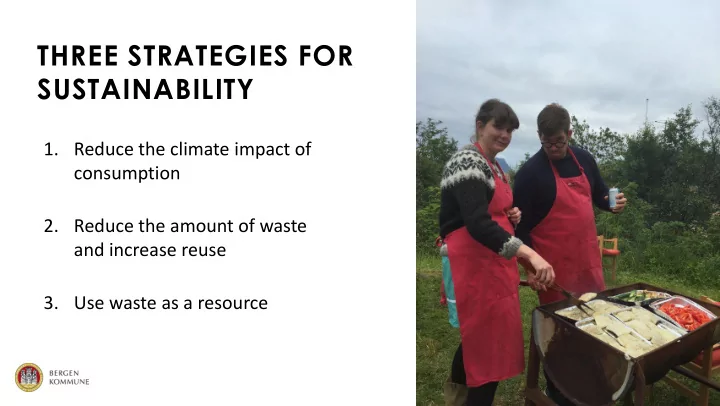

THREE STRATEGIES FOR SUSTAINABILITY 1. Reduce the climate impact of consumption 2. Reduce the amount of waste and increase reuse 3. Use waste as a resource
POLITICAL PLATFORM Goal: To make Bergen Norway’s most sustainable city Priorities regarding sustainable food • Exclusively vegetarian meals once a week in municipal cafeterias • Always offer healthy, tasty vegetarian options in municipal cafeterias • Reduce food waste in municipal institutions • Cooperation with businesses to reduce food waste • Protect topsoil against development • Sustainable, tasty and healthy meals served at After School Programs • Sustainable, tasty and healthy meals served at senior homes • Sustainable farming in Bergen • Funding schemes for local food production and farm-tourism • “The city farmer” • Provide funding for schools to make allotments
MAIN GOALS IN THE GREEN STRATEGY • 2020: Bergen will reduce direct greenhouse gas emissions by 30% compared with 1991 • 2030: Bergen will be fossil-free, meaning that no oil, coal or gas is used in Bergen • 2050: Bergen will be a 1.5-degree city. The goal is for the people of Bergen to limit their climate footprint in line with the UN agreement on climate change
THE IMPORTANCE OF SUSTAINABILITY AND SUSTAINABLE FOOD • As a municipal player, Bergen has a commitment to contribute to the national overall goal of reducing food waste by 50% by 2030.
FOOD WASTE • In 2019, the city council decided to intensify the municipality's work on reducing food waste. In the extension of the decision, a pilot project has been carried out at two nursing homes with the aim of reducing the food waste in the nursing homes as well as drawing up a template for how the other nursing homes in the municipality can work to reduce their food waste. The project continues in 2020. • Work on defining how local capacity and surplus food in city districts can be utilized began in 2019, and by 2020 we will hopefully have in place the municipality's first local food bank (s) based on the voluntary centers operated by the municipality.
BERGEN FOOD BANK • Bergen's first food bank was established in 2017, and opened in November of the same year. • Matsentralen Bergen is a collaborative project between several of the charities in Bergen, and is founded by the Church City Mission, the Red Cross, the Salvation Army, the Robin Hood House and the Blue Cross. • Through collaboration with wholesalers COOP Hordaland, Rema 1000, ASKO, BAMA / BARE, Nortura, Matvarehuset and TINE dairies, in addition to ORKLA the central in 2018 received and redistributed about 400 tonnes of food, estimated at 800,000 meals. • Bergen Food Bank distributes food to large parts of Hordaland (about 20 municipalities) through a network of 85 non-profit organizations, and estimates that in 2019 they will redistribute approx. 500 tonnes of food, estimated at 1 million meals. • In addition to its work as a distribution center for food, Matsentralen Bergen gives lectures on food wastes for educational institutions at all levels with the aim of reducing food wastage at the value chain's highest loss; consumer.
BERGEN IS A UNESCO CREATIVE CITY OF GASTRONOMY • Commitment to work on the link between food and sustainability – UNESCO is a part of the UN and therefore closely linked to the UN Sustainable Deelopment Goals • Sustainable Gastronomy Day • Food waste
PROJECTS AND ACTORS WORKING ON FOOD AND SUSTAINABILITY • Impact Hub has a food foundation program where a number of the foundations work on food and sustainability. They were also the arena for startup weekends on food and sustainability, lectures on food and sustainability about the Climate Festival. • Matarena (Food arena), has started a by-catch project to strengthen the expertise in the use of a variety of fish. This entails sustainable use of marine resources. Matarena has also had its own competency program for sustainable product development of by-products, aimed at the industry. In addition, they organize the food festival where there is a lot of focus on sustainability, last year also with its own organic area. • NCE Seafood Innovation Cluster The NCE Seafood Innovation Cluster has a number of sustainability programs, including started study program for sustainable food in the sea. They receive firm support from Nutrition. Passion for Ocean.
How can research help us move forward? • Important for politicians and lawmakers, to contribute to more sustainable food systems and consumption
Recommend
More recommend